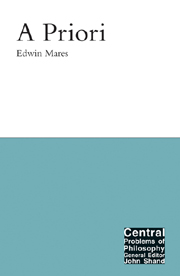13 - Scorecard
from Part III
Summary
Taking stock
Now that we have finished our glimpse into applications of a priori reasoning, it is useful to look back and think about which theories of a priori belief are best combined with which fields of enquiry. Clearly, one of the big winners of this investigation is the use of coherence methods. We use such methods to reason about every one of the fields that we have discussed. In what follows, we look at the other theories of a priori belief and summarize their successes and failures.
Rationalism
Rationalism is the doctrine that rational insight can give us true beliefs about the world. In its analytic and Aristotelian forms we deal with it under “analytic justification” and “Aristotelianism”. Rationalism has coherentist, foundationalist and reliabilist forms.
• Ethics: It seems implausible that we have rational insight about moral truths that are not analytic. There is a serious danger of dogmatism with this view.
• Logic: Rationalism seems to be of little help since rational insight requires, perhaps among other reasoning abilities, logical abilities.
• Mathematics: linked historically with Platonism. A foundationalist rationalist might accept some mathematical beliefs as basic.
• Modality: Given an argument for the existence and diversity of possible worlds, it seems reasonable to accept what rational insight tells us about the contents of other worlds.
Nativism
Nativism is the doctrine that we have innate ideas, beliefs or abilities.
- Type
- Chapter
- Information
- A Priori , pp. 205 - 208Publisher: Acumen PublishingPrint publication year: 2011



